Knowing the homesteading basics will put you on the fast track to living a simpler, more sustainable life on your property.
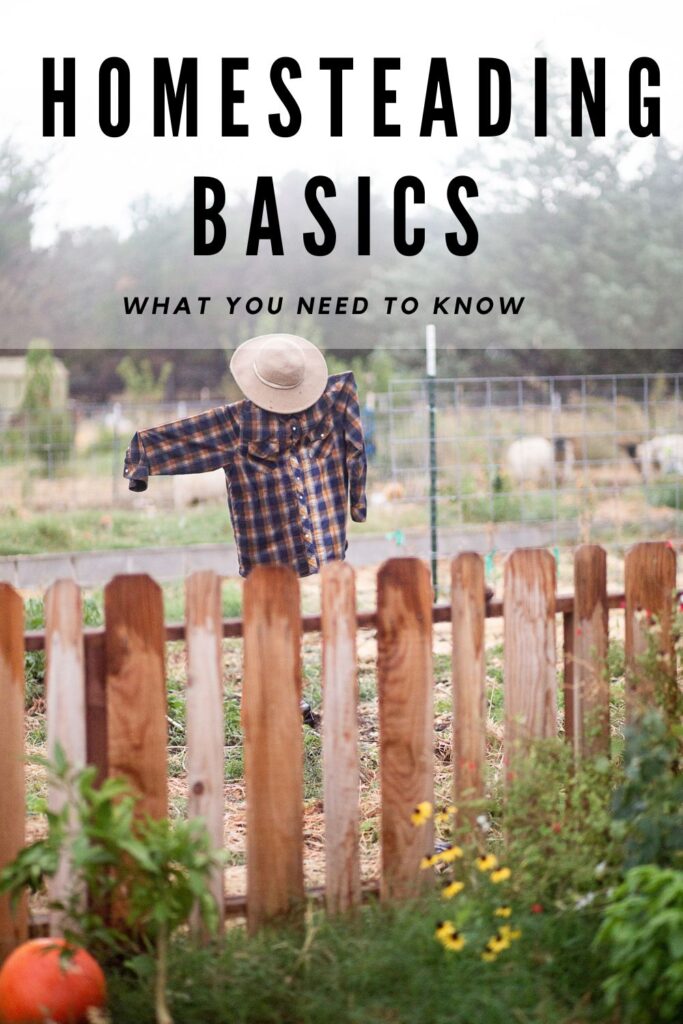
Not every homesteader produces and does the same skills, but there does tend to be some overlap of skills that many of us do. The beauty of this lifestyle is that you get to choose what you will learn and partake in on your own property. These simple homesteading basics will give you some ideas to get started, if you are a beginner.
The skills that you choose are going to have a lot to do with your personal “why” for homesteading. The following ideas are just ideas because there are many more homesteading skills that you can dive into. They seem to be the most versatile and useful for cultivating a simpler more slowed down life. Let’s get started!
Homesteading basics
1. Cooking from scratch
This homesteading skill has to be on the top of the list, since it requires no land (a common excuse for not getting started), and will pay you in dividends over time. Learning to cook from scratch is a lost art in our current culture, and is one of the FIRST homesteading basics you should master. It will help you so much to know what to do with all of those beautiful fruits and vegetables after you start your dream homestead garden.
Things like homemade granola are a simple and less expensive way to start turning what you used to buy into a from scratch go to.
Keep in mind, you DO NOT need to be growing your own food to start cooking from scratch. Just use whole foods you can find in the grocery store or at the farmer’s market. Here are some ideas of things to learn how to make from scratch:
Dutch oven popcorn
Learn how to make popcorn in a dutch oven. This method is incredibly easy and only takes a few simple ingredients.

3-ingredient all butter pie crust
Make this 3 ingredient all-butter pie crust that is light and flaky with only a few ingredients from the pantry!
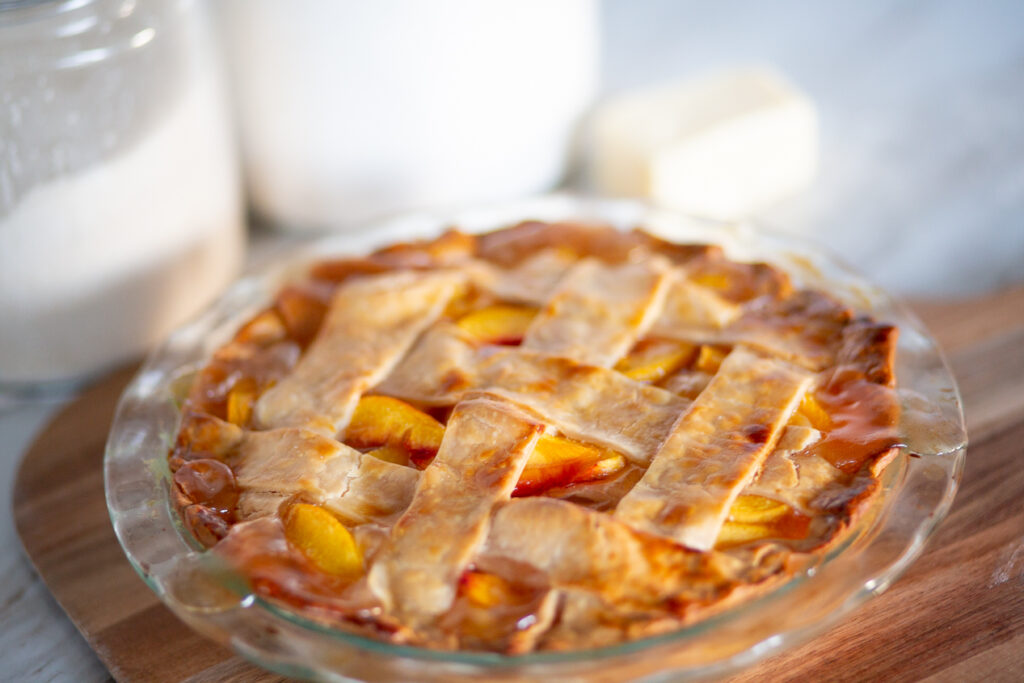
Whole wheat sandwich bread
This whole wheat sandwich bread will be the only whole wheat bread you will need! It is so easy, especially if you own a kitchen aid mixer!

Basic granola + variations
This basic granola recipe with variations and you will never need another. It is the best and only granola you will ever need.

2. Gardening
Not every homesteader gardens, but many do. Gardening provides food just steps outside of the kitchen, which improves sustainability. Learning how to grow SOMETHING will help you develop an essential skill to provide for you and your family.
Grey and I started with ONE raised garden bed, which grew from there. Now 1/2 of our property goes to growing food.
There are two types of gardening to consider, the annual garden and perennial gardening. In the long run perennial gardening through fruit trees, berry vines, etc. Provide you with more bang for your buck. Annual gardening is where a lot of people start, because it is simpler and only requires one season experimentation. Gardening is one of the first homesteading basics that newbies think of. Just start small! Here are some of our most popular gardening articles to get you started:
How to Grow Garlic
Garlic is a powerhouse on the homestead. It is easy to grow, and has an excellent shelf life.

Grow Your Dream Homestead Garden
Learn how to start your own homestead garden with this complete guide and resource list for a productive harvest.

How to Enjoy Gardening When it’s not Your Thing
If you’re not into digging in the dirt, but want to learn how to enjoy gardening because you have one for practical reasons, read this article.

The Ultimate Guide to Garlic Harvest Time
Need to know what to do when it’s garlic harvest time? Learn how to process your garlic from harvest to storage so that it lasts all year!

How to grow grapes
Learning how to grow grapes will add much value to your garden. A home vineyard is a sure way to have fresh fruit year after year right within your own backyard.

The Ultimate Guide to Pruning Fruit Trees
Everything you need to know about pruning fruit trees in your home orchard to maximize fruit production!

How to Grow Artichokes
Artichokes are one of the easiest to grow and most nutritious vegetables. Learn how to grow artichokes.

3. Preserving food
The skill of preserving food will come in handy when you’ve got meat, eggs, milk, fruit, and vegetables coming in from your property. Even before then learning to preserve food when you find a good deal at the farmer’s market will serve you well. Preserving food used to be a household skill that many people knew something about.
With all of the conveniences of pre-packaged goods, our culture has gotten away from that. By learning this skill you will improve your family’s health and pocket book. Here are some ideas to preserve food:
Home-Canned Tomatoes
Preserving tomatoes at the peak of their ripeness ensures having that delicious summer flavor throughout the year. Home canned tomatoes, will allow for year round fresh tomatoes–even in winter!

How to Get Started Canning for Beginners
How to get started canning your own fresh food by learning the basics. Understanding how to can is easier than ever!
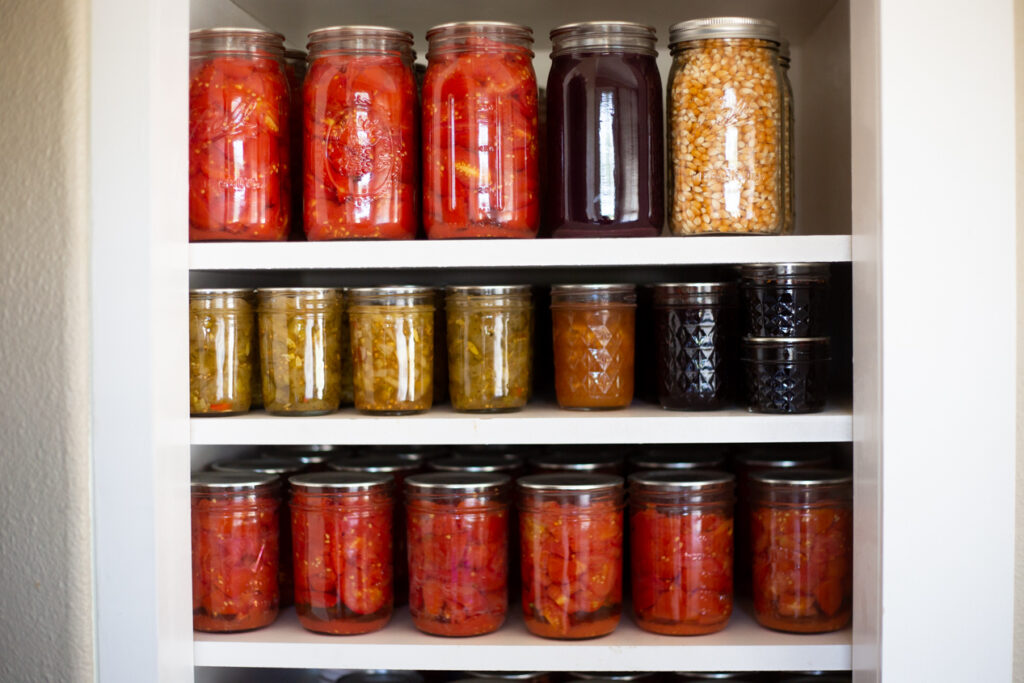
Home-Canned Grape Jam
This home-canned grape jam recipe is perfect to top toast, cookies, or to give as a gift. Preserve home grown concord grapes with this easy recipe for grape jam.

How to Freeze Dry Raw Eggs
How to freeze dry raw eggs the right way to give them a 25-year shelf life! This step by step will guide you through the process.

Small Batch Refrigerator Dill Pickles
Crisp, dilly, and crunchy these easy refrigerator dill pickles recipe small batch are perfect for if you only have a few cucumbers to pickle.

12 Ways to Preserve Grapes
Late summer on the homestead can mean an abundance of grapes! Discover 12 ways to preserve grapes for your next harvest.

Refrigerator Pickled Beets
This easy recipe will eliminate canning. Learn how to make quick refrigerator pickled beets for salads or snacking straight from the jar!

Home-Canned Lemonade Concentrate
How to make home canned lemonade concentrate to store lemon juice for a hot Summer day. Just add water when you are ready to serve!

Water Glassing Eggs
Water glassing eggs is an old fashioned way to keep eggs fresh all year long. Learn how to water glass eggs with this step-by-step tutorial.

How to Can BBQ Sauce at Home
Learn how to can bbq sauce from scratch to have a this sweet and savory condiment always on your pantry shelves.

4. Pantry Management
Not many people think about managing a pantry as homesteading basic, but it is essential to being successful in actually using what you produce. Improper pantry management will lead to wasted food and wasted time. Especially if you happen to keep a rather large pantry, as many homesteaders do, this is crucial.
Things can get disorganized and messy FAST! Developing a system for rotating food similar to a grocery store will allow you to use up food before it goes bad. Not to mention enable you to stay ahead of the inflation curve, meaning you will be saving money. Here are our simple steps to creating and manageing a large pantry:
- Start by thinking about what your family actually uses and create master list of items both edible and non-edible that you would like to keep in your “store.”
- Type or write out this list an determine what you need and what you already have.
- Include quantities of items as a target to always have. Think of this as your store inventory.
- Identify a spot in your home that will be your pantry. Get creative here! A closet, unused bedroom, little nook in a stairwell will all do as long as they are dry, cool, and dark.
- Start building your inventory and develop a system to push the hold stuff to the front and the new stuff to the back.
- Set up a schedule for when you will take inventory and restock.
Here are some great pantry related articles:
How to Store Food Long Term
How to have a long term food storage pantry to save money, have food security, and boost preparedness!

Pantry Inventory List to Boost Food Security
Create a pantry inventory list to always have what you need on hand. It will save time, money, and boost your household food security!

How to Beat Inflation at the Grocery Store
How to beat inflation at the grocery store with these old-fashioned methods that have been used throughout history.

Best Amazon Long Term Food Storage Containers
Having an extended pantry is great for saving money in the kitchen. Here are the best Amazon long term food storage containers.
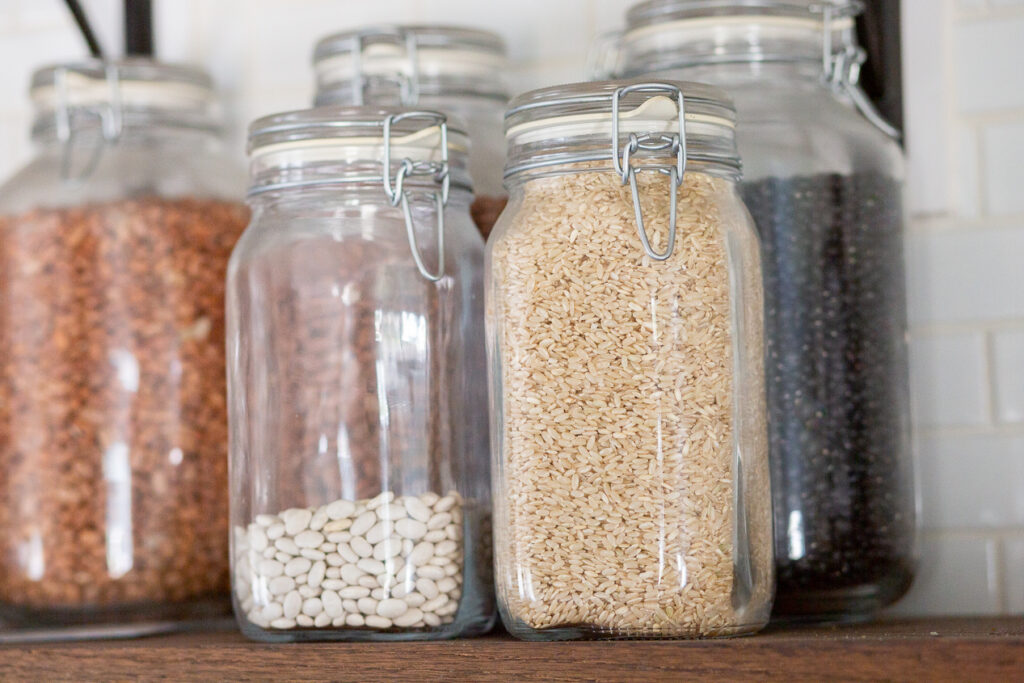
How to Seal Mylar Bags for Long Term Food Storage
How to seal mylar bags to ensure that your long term food storage pantry is protected against pests and the elements.

Why a Freezer is Essential
Learn why a freezer is essential on the homestead. Every productive home should have plenty of freezer space to boost productivity and preparedness.

How to Store Rice Long Term
If you want to boost food security, consider storing grains at home. This guide will teach you how to store rice long term at home.

5. Meal Planning
Meal planning on the homestead looks a little different than if you are simply buying whatever you feel like eating week to week. When you start homesteading, consider meal planning like we do as well. This starts by determining what is already in the pantry and the garden.
Naturally, this creates an eat in season model since we are using what we have available on the property. Make a list of what you already have and build from there. Your weekly grocery haul eventually will be very small. Another thing to consider when meal planning like a homesteader is what do I have that needs to be eaten before it goes bad. This can be written down during your scheduled pantry management sessions.
6. Raising Chickens
Backyard chickens are called the homesteading “gateway drug” for a reason. Many people start with a small flock in the backyard, which ends up snowballing into so much more. Raising chickens for eggs is an easy way to get protein on your property. There is a reason that this is one of the homesteading basics for so many beginners. Chickens can be kept with very little property even if you live in the city (check with local ordinances.) Chickens make wonderful composters, and will keep you with fresh eggs throughout their laying season. If you are wanting to start your own backyard flock check out these articles:
How to Build a Hoop Chicken Coop
Learn how to easily build a hoop chicken coop at home. Your diy hoop coop will keep your flock happy and healthy!

Water Glassing Eggs: A Step-by-Step Guide
Water glassing eggs is an old fashioned way to keep eggs fresh all year long. Learn how to water glass eggs with this step-by-step tutorial.

What is an Easter Egger Chicken?
An Easter egger chicken is a great addition to your homestead or backyard, since they produce such beautiful eggs.

How to Freeze Dry Raw Eggs
Learn how to freeze dry raw eggs the right way to give them a 25-year shelf life! This step by step will guide you through the process.

7. Raise Sheep or Goats
Sheep and goats are great options for the smaller homestead. Unlike cows they require much less feed making them a sustainable option if you do not have established pasture and lots of land. Both sheep and goats can be raised for dairy or meat making them versatile and worthwhile. We use our sheep to help us clean weeds organically. They also make for excellent fertilizers. Selling the lambs is also a great way to make a little extra income. To get started raising sheep check out these articles:
How to Have a Successful Lambing Season
How to prepare for a lambing season on the homestead. This step by step guide will help you have success year after year.

What to do when sheep give birth
This simple guide will help you understand your part in what to do when sheep give birth.

How to Care for a Bummer Lamb Properly
Care for a bummer lamb or an orphan lamb until it can eat hay or grass. Read these tips that will lead to success.

How to Prep for Butchering Day (DIY and Outsource)
Knowing how to prep for butchering day on the homestead, is the difference between success and failure. Here’s what you need to know.

8. Be Frugal
Learning to use what you have is a homesteading art. Up-cycling, re-using, and bargain hunting are all part of the homesteading lifestyle. Living well within your means not only helps you reach your financial goals, but also makes your household more sustainable. Homesteaders also strive to reduce energy consumption, by line drying laundry, solar cooking, and even living in smaller homes. There are many ways to reduce your household expenditures. Learning to live well within your means is an important life skill outside of the homesteading community, but an essential for the homesteading basics.
Family of 5 Living in 800 Sq. Ft.
Do you have a big family and small living space? Learn how a family of 5 living in 800 sq ft does it, and you can too!

9. Get Organized
Many people outside of the homesteading community need this essential life skill as well, but it needed to be mentioned here. There are many moving parts when you choose the homesteading lifestyle. Especially if you are homeschooling like us, have kids in 4-H, running a few businesses, and have multiple homesteading ventures.
Life can get messy! Learning your own personal organization style will help you grow exponentially on the homestead. Meal planning, pantry management, garden planning, and organizing schedules are all a part of this. There is no one way to organize best, since this is highly personal. If you haven’t started keeping important dates, to dos, and goals in one place it’s a good idea to start now. The first step to homestead organization if you are a beginner is to sit down and just plan what you hope to have.
Homestead Planning | What to Have on a Homestead
This simple guide will help you get ideas for what to have on a homestead to have a prepared productive home. Making a plan will allow you to strategically learn the homesteading basics you need to have a successful homestead.

How Keeping a Commonplace Book Will Change Your Life
If you’ve ever wanted to start keeping a commonplace book you are in the right place. Here is why and, more importantly… how to start one.

10. Learn the Value of Homemaking
Homemaking has made a recent resurgence, which is so great. Everyone whether working out of the home or not, need to do some level of homemaking to make a house a habitable pleasant place to be. Making a house a home means making the home a central hub, not simply a place to eat sleep and leave. The home is the place to be! Homemaking is to for the faint of heart, and can be not seen for how important it actually is. Many activities fall under the category of homemaking such as:
- Cooking
- Cleaning
- Scheduling activities
- Decorating
- Organizing
- Maintenance
- Shopping
- Child Care
Here are some helpful articles for you to get started homemaking:
100 of the BEST Homemaking Quotes
If you need some homemaking inspiration you are sure to find some in this collection of 100 homemaking quotes!
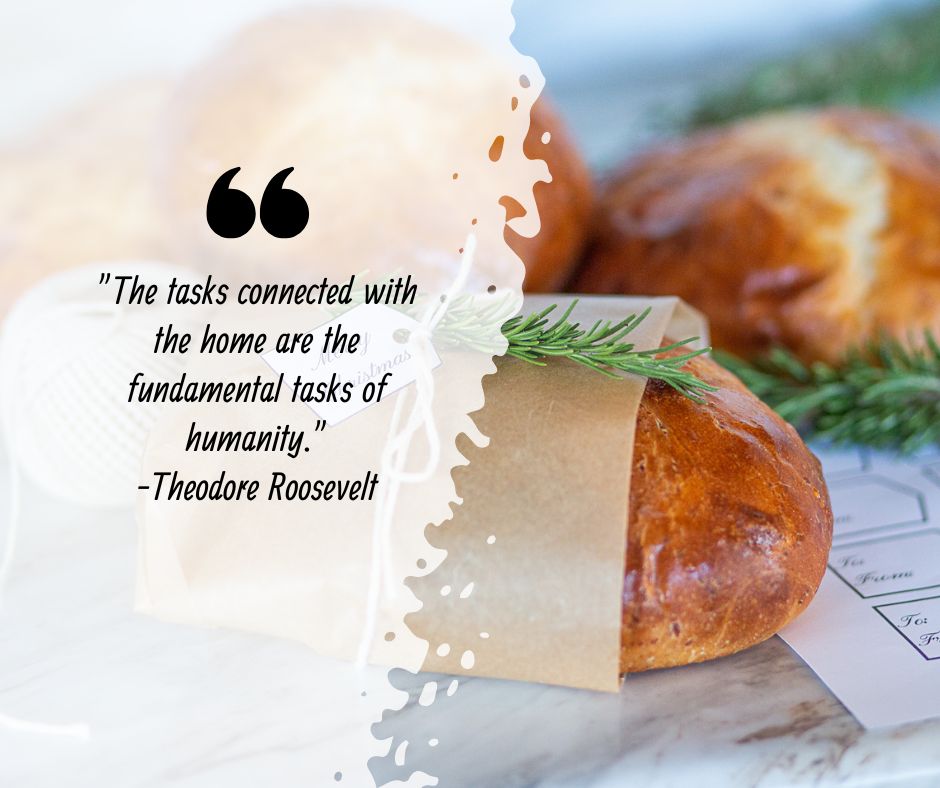
The Ultimate Guide for Modern Homemaking
If you are keeping a home in the 21st century, this guide is your one stop shop to encourage you in your modern homemaking journey.

11. Cook with Cast Iron
Cooking in cast iron not only will improve your health, but also you budget! Cast iron pans last…err…forever! Learning how to restore, season, and cook with cast iron is a homesteading basic that even rookies can master. Cast iron cooking is perfect for homesteaders because you can take meal cooking outside when there is a power outage.
How to Restore a Cast Iron Skillet
Learning how to restore a cast iron skillet will save money and keep your cast iron going for generations. Master the art of cast iron cooking today!
Best Cooking Utensils for Cast Iron
Cooking with cast iron is an art! Here are the best cooking utensils for cast iron that will up level your cast iron cooking experience!
Cast Iron Pancakes: The Ultimate Guide to a Classic Breakfast
Cast iron pancakes will be your new family favorite for Saturday Mornings. All of the convenience of non-stick without the toxins.
How to Cook Bacon in Cast Iron: A Crispy Perfection Guide
Learn how to cook bacon in cast iron to use one of the most durable cookware surfaces around. Cast iron cooking is timeless!
12. Composting
Learning how to compost is one of those homesteading basics that is extremely important! Compost is often called “black gold” in the gardening community. Not only does effective composting provide you with rich nutrients to put back into your garden soil, but it also is an effective way to turn waste into a valuable asset around the homestead. Composting makes the entire system of yearly gardening sustainable. To get started check out this article:
What is Compost Tea? Plus, How to Make it
Compost tea is a homesteading basic for the garden. This guide will give you all the information about what compost tea is, and why you should brew it!

More homesteading basics articles:
Homesteading for Beginners (What you Actually Need to Know)
How to Start Homesteading (TODAY!)
101 Homesteading Books You Need at Home
Grow Your Dream Homestead Garden
The Ultimate Guide to Pruning Fruit Trees
How to Be More Self Sufficient
What are homesteading basics?
- Cooking from scratch
- Gardening
- Preserving food
- Pantry management
- Meal planning
- Raising chickens
- Raise sheep or goats
- Be frugal
- Get organized
- Learn the value of homemaking
- Cook with cast iron
- Composting
Pin it for Later!


Leave a Reply